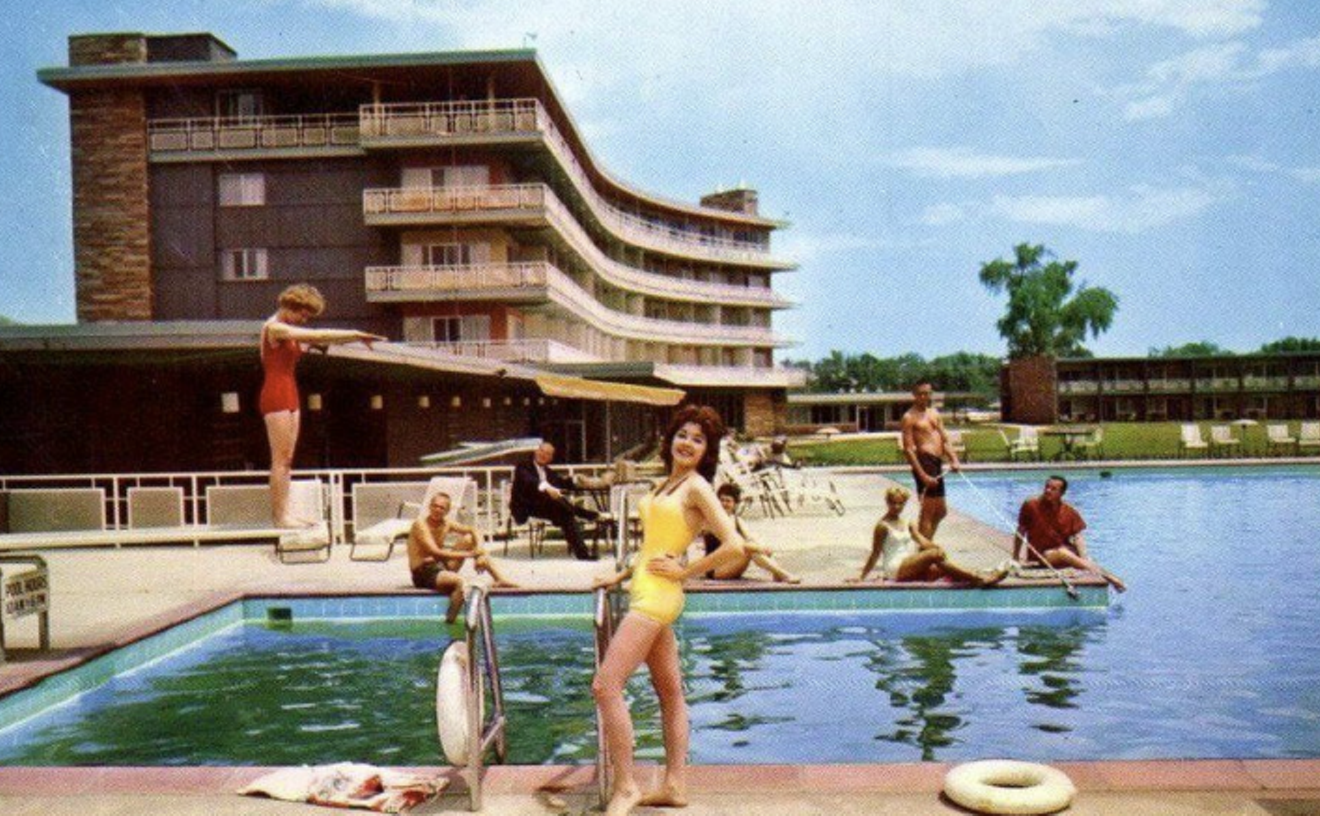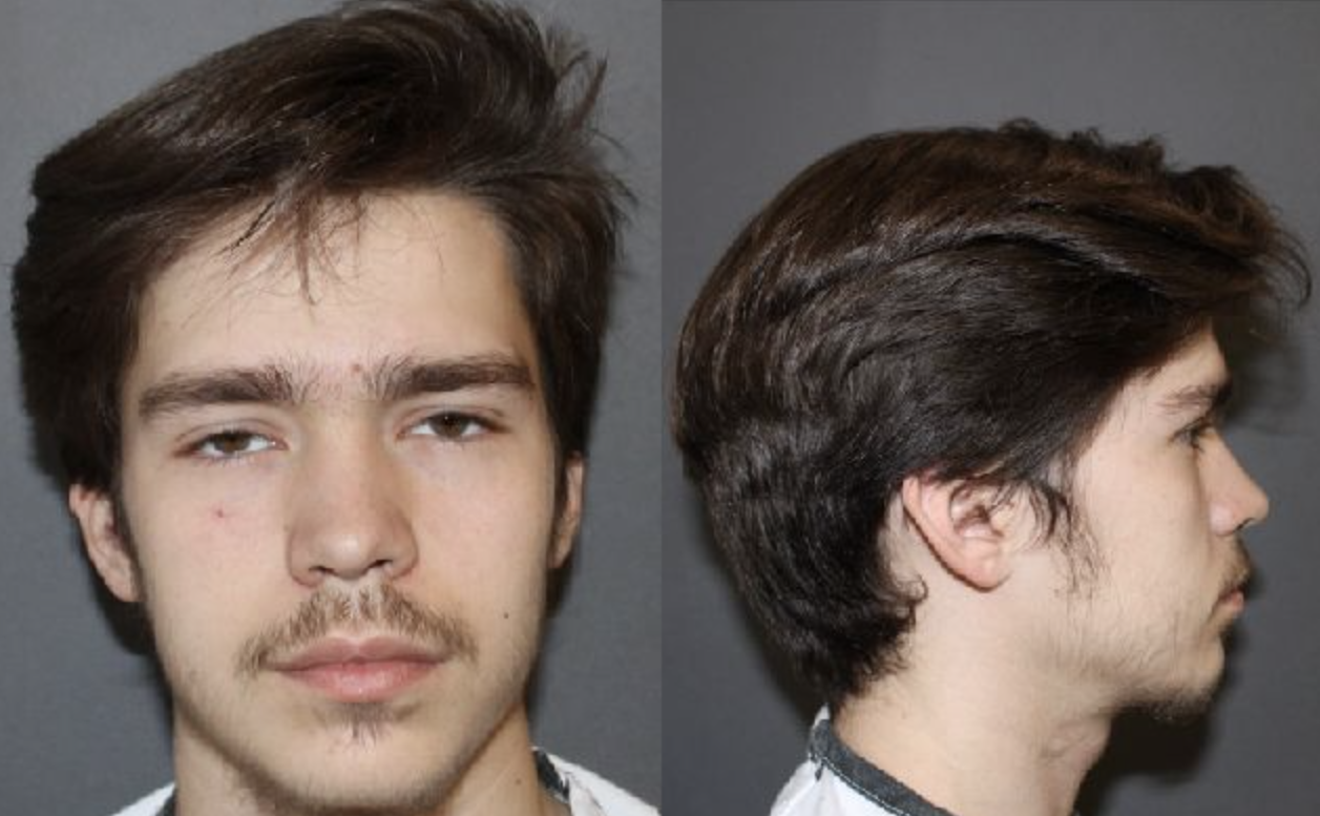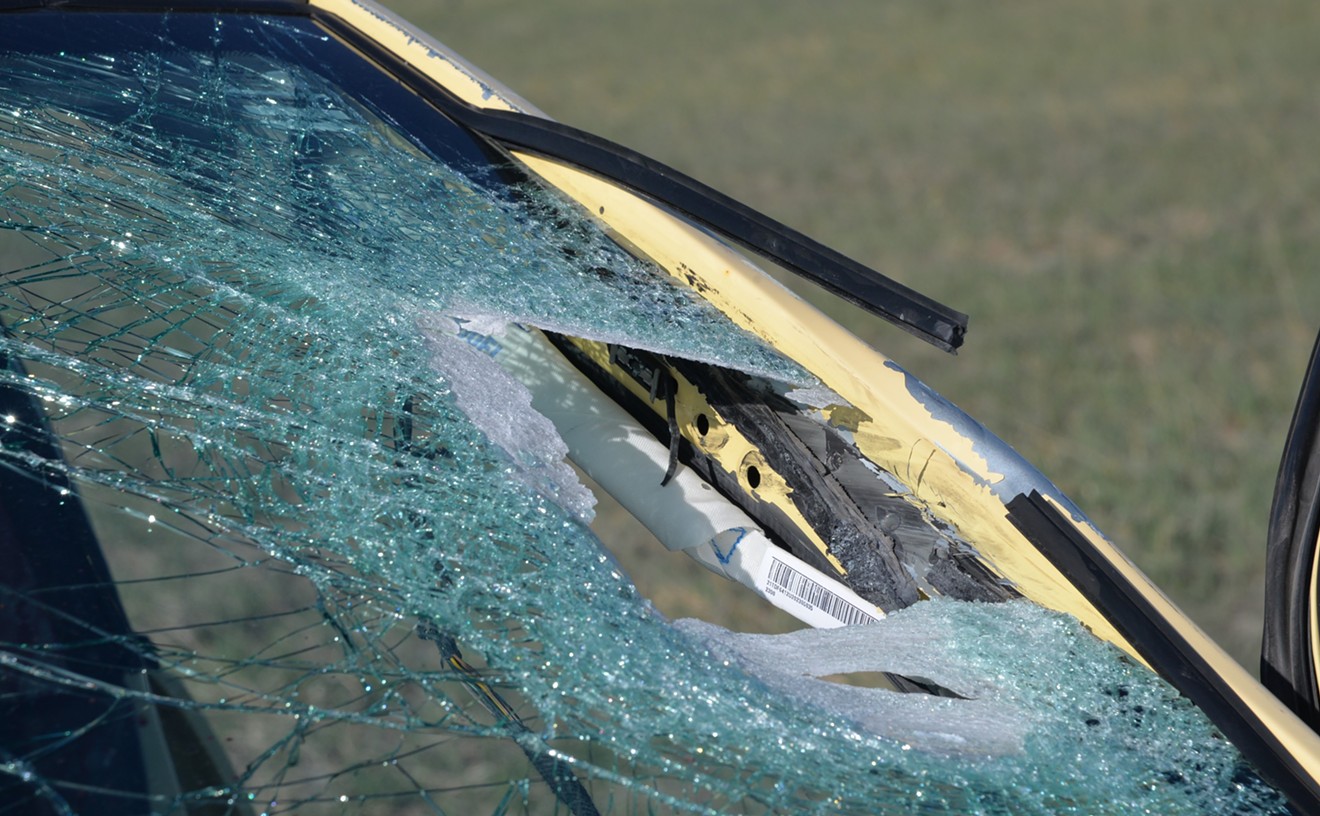Louis Robinson smiles and shakes his head as he slaps his cards down triumphantly. "Shouldn'ta played that last card, Leroy," he lectures. "Shouldn'ta done that."
Leroy "Smooth Mouth" Porter jerks his attention away from a steamy soap-opera scene to stare at his friend's hand and then back at his own. He looks betrayed. "I know it," he says at last, tossing down the cards and scowling beneath his Russian faux-fur hat. "I know it." He digs his thumbs under the purple suspenders that cross his shirt and turns his round face back to the television while Louis shuffles the deck.
Old men. Old friends. And a friendly little low-stakes game that's been running nearly four decades in this building at 2745 Welton Street.
Louis is a big man with thick, sausage-sized fingers--four of which are adorned with gold, diamond-studded rings--that testify to forty years of hard labor with the International Cement Masons' and Plasterers' Union. But he can rapidly snap cards off the new deck with a sound like firecrackers to start what must be the billionth or so game in his long association with Leroy.
Louis moved to Denver in 1946 from Lake Charles, Louisiana, by way of Lubbock, Texas, looking for work. "It got so I couldn't stand the racism in the South no more," he says. "I was gettin' away from segregation, only I run into more segregation here."
At the time, the local chapter of the International Cement Masons' and Plasterers' Union wasn't interested in giving jobs to blacks. But after Louis and his father, a union member already living in Denver, complained to the national headquarters, the problem was straightened out. "After which we had a real good union, one of the best in the United States," says Louis.
Leroy, too, fled the South for Denver in 1957. "A school friend invited me," he says, studying his new hand. "His people were kin to my people...I was trying to get away from the segregation, too." He left Colorado for California in 1963, "the year Kennedy was shot," returning in 1969 to work for the Veterans Administration Hospital until he retired.
As the afternoon wears on, more of "the boys" show up and take seats around the table. Howard "Jay Bird" Wilson, a thin, sharp-faced man in a blue cowboy hat with a yellow-bandanna hatband. Booker T. Hill, known to his friends as "Booger--'cause he's slicker than snot." Frank Wilson, who keeps the game lively with his nonstop banter. And Richard Stemler, at 59 the "youngster" of the group.
The boys even have a name for their social club: the La Paz 12. "That means 'the peaceful 12,' that's the Spanish words for it," Louis says. Throughout the remainder of the day and on into evening, elderly men drift in to play or stand around behind the card players, ragging on each other. Others poke their heads in the door just to see who's still playing before moving on down the street.
This afternoon the game is "Tonk," which is similar to gin rummy--losers each pay a dollar to the winner, possibly two if they've doubled down. Another day it might be poker, or pinochle, or maybe a lively game of dominoes.
The building where the old men gather as many as six days a week--depending on how cold it is outside and in--was even colder eighty years ago, when it was the home of Douglass Mortuary.
"One of the first undertakers in the state," says Booker, who doubles as the group's unofficial historian. "The plumbin's still all in back there." He hooks a thumb over his shoulder to indicate the shadows toward the rear of the building and then proceeds to scandalize his fellow card players by telling how he once went through a trap door in the back and down into a quasi-basement, where he found the mortician's old "cooling board."
"That's where they put dead people when they first bring 'em in," notes Louis.
Frank rolls his eyes at Booker's temerity. But Booker just shrugs and adds, "It had a drain in it."
Booker arrived in Denver in 1948 on a train from Texas. Pointing this way and that as he looks out the front door, he recalls the Five Points he knew. "Over there was Mrs. Gaines's chickens--you could buy live chickens, turkeys and rabbits, sometimes even a 'coon. Over there," he says, looking directly across the street at the new Five Points Plaza, "was a hog farm."
Booker made a living hustling newspapers and fry pies. "I was just a kid," he recalls. "They used to call me the Potato Pie Boy."
And when Booker T. "Chicago" Jones turned the old mortuary into the Ritz Shining Parlour in 1953, Booker Hill started his own shoeshine business.
Chicago Jones had two shoeshine stands of his own and a pool table to occupy waiting patrons. "It was his ol' lady, Miss Nan, let me come into the place with my own little stand," says Booker.
There was plenty of business for all. On Sundays the preachers and churchgoers stopped by for a quick shoeshine. But the place really got crowded in the evenings, especially Fridays and Saturdays, when the clubs were hopping.
"Everybody dressed sharp back then...weren't no tennis shoes," Booker recalls, looking down at his own Nike Airs. "And if your shoes weren't shined, you weren't dressed."
It was the heyday of Five Points as a jazz hotspot. Blacks weren't allowed in many of Denver's white nightclubs, but that didn't stop whites from flocking to Five Points to enjoy the music.
Even the big-name musicians would come to the Ritz for a shine. Booker reels them off: "Ray Charles, Fats Domino, 'Gatemouth' Brown..."
Still, the Ritz Shining Parlour had closed by 1957 and stood empty for a year.
Then two enterprising friends, Jesse Smith and Jimmy Knight, got the idea of opening a pool hall in the building. His health failing, the proprietor of Wheat's Billiards down the block agreed to sell the pair his pool tables. With the help of Louis Robinson and friends, Jesse and Jimmy moved the tables to 2745 Welton, where they'd painted the walls and buffed the hardwood floors bright as a new penny.
J&J Billiards opened in 1958 with five pool tables and one for snooker. In the back room, where the mortician had once worked, the founding members of what would become the La Paz 12 established their card and domino games.
"When I came here in 1960," says Richard Stemler, who this afternoon has been one of the watchers, "it was still going good. You could stand on the corner and look down toward the Rossonian and not be able to see the street, there'd be so many people. White and black ...almost in equal numbers. Everybody who came to Denver wanted to know, 'Where's Five Points?'"
Like many of the other boys, Richard, a native of Baton Rouge, arrived in Denver with the military and stayed on because "I liked the city, especially the strength and character of the black community," he says.
"Five Points was more than just entertainment. We had a grocery store and two drugstores. A movie theater. A Chinese restaurant. The Ritz Cafe...It was the focal point for the black community." Richard himself started several local businesses, including the Louisiana Fish Market. He's one of the few "not yet retired" original members of the La Paz 12, and he officiates at sporting events.
Richard walks over to Leroy and begins patting down the older man's pockets in what has become a ritual for others in the room. "Where's the candy, ol' man?" he asks, while Leroy shoos at him like he would a pesky fly and tries to concentrate on his cards and the small pile of bills before him on the table. But Richard doesn't leave until his hand emerges from one of Leroy's pockets holding a peppermint candy.
The card game rolls on into the evening. A few empty bottles of Thunderbird and Old English Malt join the pile of soda cans tossed into a corner.
Younger men hang out on the corners or drive past in their cars with the stereos booming; few come in here. This is the boys' place, and they are left alone to tell their stories, many of which center on women and younger days.
"I was in Washington, D.C., once...never seen so many women," says one. "They didn't mess around, neither. It was, 'Let's get it on.'"
"Yeah," says another. "I hear there is ten women to each man."
And another adds, "And they say they is bold, too."
Ten to one. A half-dozen gray heads shake at the thought of such a utopia.
The Sixties brought many changes to Five Points. The civil rights movement made it possible for blacks to move into other areas of the city, with houses newer than the seventy- and eighty-year-old homes that lined neighborhood streets.
"The black man aspires, just like the white man, for better homes to raise his family in," Richard says. "But it wasn't because the area went bad."
Louis and his wife and children moved to Park Hill in 1964. "Blacks would move in and the whites would move out," he says, then laughs. "Now the whites are trying to buy Park Hill back, which is all right with me, so long as they don't want my place."
As black families moved out of Five Points, the black businesses that had counted on them began to go under. But J&J Billiards struggled on.
"We may have moved to other places, but we never abandoned Five Points," says Louis, pointing to his comrades. "'Course, I pretty much go from my car to this place here and then back to my car."
In the Seventies Five Points gained a reputation--unfairly, the boys say--for crime, drugs, and then gangs. "If you believe the newspapers," says Richard, "then a female is not safe to walk up and down these streets. But every man respects a female on these streets or they won't be around long."
"I've been coming to this place for forty years," says Louis. "No one has been killed. There haven't been no fights, nothing. Just people associating and having fun.
"I'm not saying there's no dope around here. Whatever these guys are doing on the corner down the block is no concern of mine. I wouldn't know a piece of dope if it was laying in front of me."
In 1979 Jesse and Jimmy gave their patrons the bad news: They were getting too old to run the place and were going to close down. "So I organized a little social club," Louis recalls. "We bought the equipment and leased the building, but we were nonprofit. We only charged enough to pay the gas and electricity ...just so's we'd have a place to socialize. We called it the La Paz 12. Zeb King came up with that name."
"There was a club called the La Paz in St. Louis," says Zebedee King, who left that town in 1958 to come to Denver, where he worked as a paramedic at Denver General Hospital until he retired in 1985.
But Denver's La Paz club was more than a place to meet. "We were just a bunch of regular guys who'd buy each other drinks and loan each other money," says Zeb.
"It's more like family," adds Richard. "There are no strangers who walk through that door. It's a brother thing. You never had to go without in a time of need. For forty years, it's been one hell of a friendship."
Frank Wilson arrived in 1955 with the military. When he got out, he joined what was then Denver Tramway and eventually became the Regional Transportation District. "I worked for RTD for 24 years before retiring," he says. "I'd stop off here nearly every day, starting in 1955, after I got off work, from about 3:30 to 5 p.m. It was a good way to blow off steam, so I wouldn't go home and cuss out the wife."
The boys laugh. There was a reason they never bothered to get a telephone in the place. "That way our wives couldn't call to check up on us," says Louis.
"If we had an emergency, we could always run next door to the barbershop," adds Frank.
Of course, there was nothing to stop a spouse from marching down to the club and glaring in through a window until her man, to the delight and derision of his cohorts, scampered out to face her wrath.
"Sometimes the wives and girlfriends would get a little jealous," Richard says. "Many a man lost many a woman 'cause of this place. Meeting here became a custom, then a habit...No matter what else you were doing that night, you stopped here first."
For years the club operated on a shoestring, scraping by with just enough money to pay the rent and utilities. But when the city condemned the building a few years back, the La Paz 12 didn't have enough money to buy it.
That's when some young men bought the building from the city. "You know the type--baggy pants, sweatshirts," Louis says. "Where they got the money, I don't know. But they told us that in a short time, we were gonna have to move. So we sold the pool tables and got ready. But then they lost the money."
The building ultimately wound up in the hands of Barry & Associates, a black-owned business that has already renovated the building next door. 2745 Welton has a National Historic Landmark designation, which means that it either has been recognized as having unique architecture or is associated with an important historic person or event. In this case, it was one of the first major structures in Denver built by an African-American, Jonathan Contree, who constructed it in 1915. With landmark status comes certain grant money, which Barry & Associates is using to renovate the place.
"We're just going to frame it out, redo the front so it looks like it used to, and see who wants to do what with it," says Jay Barry, who owns Barry & Associates with his father. "A restaurant, or maybe another pool hall."
The renovation is part of the revitalization of Five Points, once the heart and forever the soul of Denver's black community. No hard feelings, the boys say; progress is progress.
"We coulda kept operating, but we didn't have the tables anymore," says Louis. "So we just hung around, like we're doing now, talking and playing dominoes and cards and things...until Mr. Barry gets ready for us to go."
"Most of these guys are retired," says Richard. "They could go to the rec center or YMCA, but then they'd have to deal with the young crowd. Here, no one bothers them."
Richard points to the dry cleaner across the street and the barbershop next door, longtime Five Points businesses. "The city is just waiting for the old-timers to die off so they can buy it from their kids," he says. He nods toward his friends. A new pool hall in the building, he says, will "just attract a younger generation of men."
The corner of their old club is all the La Paz 12 have left. Away from the window, the room recedes into shadows littered with debris. The ceiling has been pulled down, exposing the century-old wooden ribs of the building, and the plastered walls are cracked. The hardwood floor is gray and battered.
Time has caught up with the La Paz 12. Some members have died. Others, like Louis, are now widowers. "It's boiled down to a select few of us," he says, studying his cards. "We have no other place to go. So until we get told we can't, we'll just keep coming down here to have a little fun talking about each other...You know how old guys do.
"The good thing is, we're all still friends...those that ain't dead. Everything else around here has changed, but we haven't changed," he adds. "We could be sitting in some other bar across town. But this building here is home to us.










